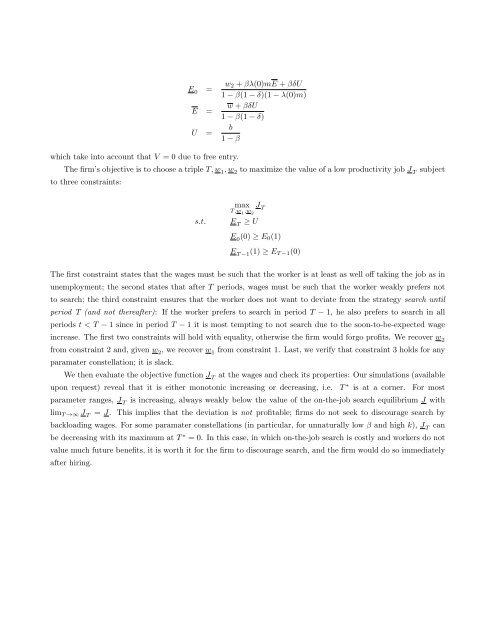Unemployment cycles
WP201526
WP201526
Create successful ePaper yourself
Turn your PDF publications into a flip-book with our unique Google optimized e-Paper software.
E 0 =<br />
E =<br />
U =<br />
w 2 + βλ(0)mE + βδU<br />
1 − β(1 − δ)(1 − λ(0)m)<br />
w + βδU<br />
1 − β(1 − δ)<br />
b<br />
1 − β<br />
which take into account that V = 0 due to free entry.<br />
The firm’s objective is to choose a triple T, w 1 , w 2 to maximize the value of a low productivity job J T subject<br />
to three constraints:<br />
s.t.<br />
max<br />
T,w 1 ,w 2<br />
J T<br />
E T ≥ U<br />
E 0 (0) ≥ E 0 (1)<br />
E T −1 (1) ≥ E T −1 (0)<br />
The first constraint states that the wages must be such that the worker is at least as well off taking the job as in<br />
unemployment; the second states that after T periods, wages must be such that the worker weakly prefers not<br />
to search; the third constraint ensures that the worker does not want to deviate from the strategy search until<br />
period T (and not thereafter): If the worker prefers to search in period T − 1, he also prefers to search in all<br />
periods t < T − 1 since in period T − 1 it is most tempting to not search due to the soon-to-be-expected wage<br />
increase. The first two constraints will hold with equality, otherwise the firm would forgo profits. We recover w 2<br />
from constraint 2 and, given w 2 , we recover w 1 from constraint 1. Last, we verify that constraint 3 holds for any<br />
paramater constellation; it is slack.<br />
We then evaluate the objective function J T at the wages and check its properties: Our simulations (available<br />
upon request) reveal that it is either monotonic increasing or decreasing, i.e. T ∗ is at a corner. For most<br />
parameter ranges, J T is increasing, always weakly below the value of the on-the-job search equilibrium J with<br />
lim T →∞ J T = J. This implies that the deviation is not profitable; firms do not seek to discourage search by<br />
backloading wages. For some paramater constellations (in particular, for unnaturally low β and high k), J T can<br />
be decreasing with its maximum at T ∗ = 0. In this case, in which on-the-job search is costly and workers do not<br />
value much future benefits, it is worth it for the firm to discourage search, and the firm would do so immediately<br />
after hiring.


